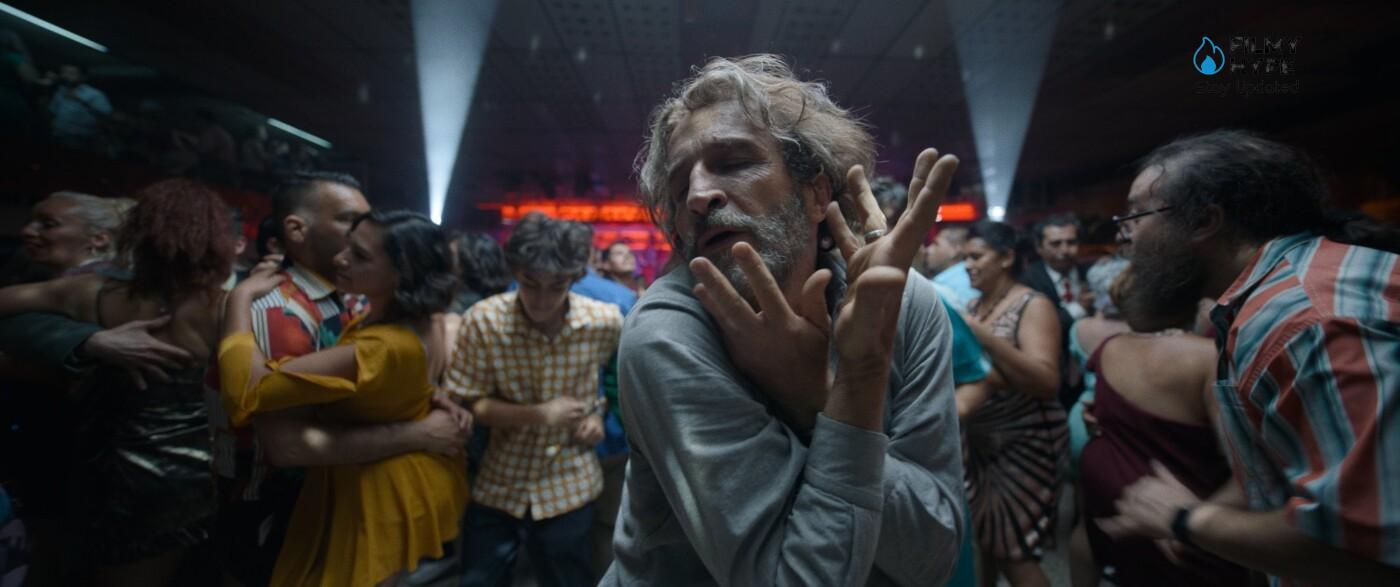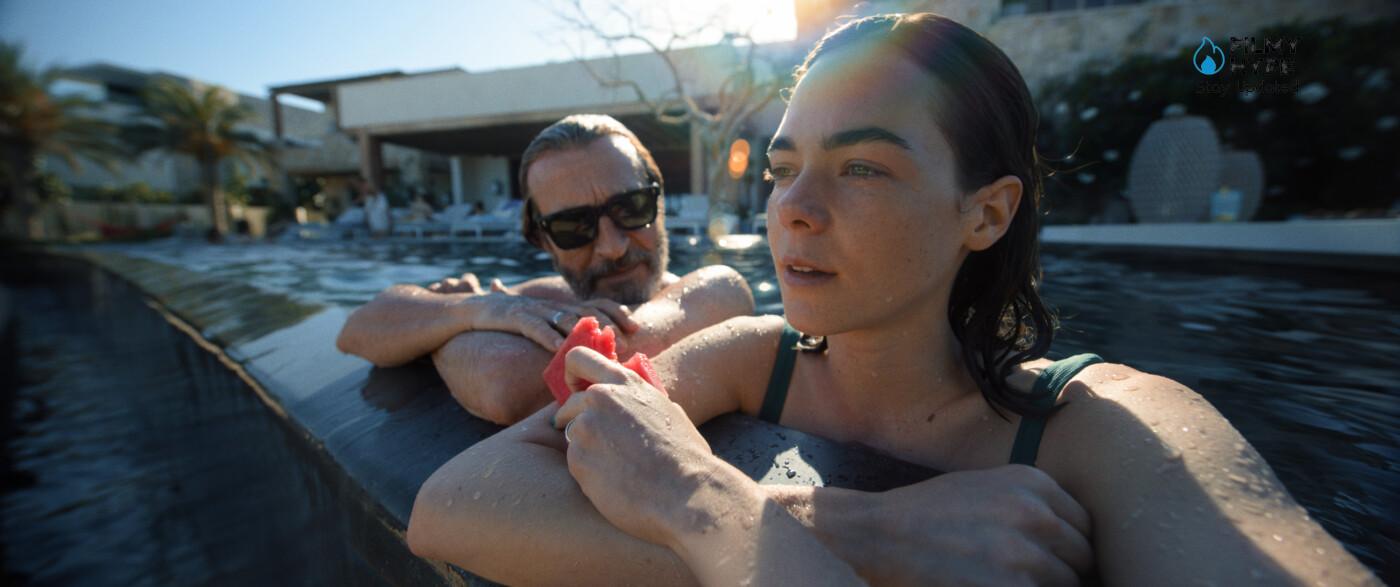Bardo Review: Vigorous and Imaginative Cinema Overwhelming, Painful and Thoughtful
Stars: Hugo Albores, Andrés Almeida, Misha Arias De La Cantolla
Director: Alejandro G. Iñárritu
Filmyhype.com Ratings: 4/5 (four stars)
Twice nominated for the Golden Lion with 21 grams (2003) and Birdman (2014), Alejandro G. Iñárritu returns to the cinema with Bardo in competition at the Venice Film Festival 2022. Accustomed to keeping his fans waiting, the Mexican director signed the new work, branded Netflix, 7 years after Revenant – Redivivo (2015), which earned him the Oscar for directing. Returning to collaborate on the screenplay with Nicolás Giacobone, awarded by the Academy for his work in Birdman, Iñárritu returns to tell his Mexico, thinking about memory and the ability of cinema to capture the truth.

Bardo Review: The Story
The story revolves around Silverio, a Mexican journalist who left his country to live in the United States. As he prepares to receive a prestigious award for his work, the man finds himself questioning himself, his choices, his life, the uprooting he has forced his family and children into, and also the politics of his Mexico, a place so loved only when you look at it from afar, from the point of view of a “luxury emigrant”, in the ease of his bourgeois life in the United States.
Bardo Review and Analysis
Bardo continues the stylistic imprint assumed by Iñárritu starting from the film that saw Michael Keaton in the role of the protagonist of a play: long sequence shots, meticulously choreographed mass scenes, distorted images from wide angles and exasperated perspectives. In tones, the title embraces Birdman’s characteristic mixture of comedy and drama, in which the director used the technique to reflect the farcical theatrical world and the neuroticism of his protagonist, this time making the very mind of Silverio a stage, which (yes) his own life, amidst regrets and joys, without however being the protagonist making his reconstruction reliable.
To believe that memory is a deposit to be drawn on to relive a past immune from distortion is naïve and in the same way, Iñárritu suggests that not even a film (or a photograph, any recording) can boast of such power. In describing the life of Silverio and his family, the feature film constantly lies, and deceives, leading us to expectations that the director then breaks with a simple movement of the camera. A continuous dance between reality and fiction that has its roots in the very nature of the cinematographic medium. A concept that has always inspired the authors and on which, for example, Tim Burton has reflected on in recent years, who with his Big Fish he came to the same conclusion that every story originates from artifice, more or less conscious, without however this necessarily making it less honest.
In its nearly three hours of duration, the title, however, wants to be much more than a reflection on the line that separates real and invented within a midlife crisis. From colonialism to religion, from the squalor of talk shows to the systemic poverty of South America, the film hits the audience like a wave with its arguments. In this, Iñárritu’s fatigue partially shows the uncovered side, with the now customary grandiloquent doing of the filmmaker who distracts from the beating heart of the story constituted by the mal du vivre that grips the protagonist. In the clear Fellini and Bunuelian references, but also his images with sometimes redundant rhetoric, Bardo risks stumbling into his ambition. Nevertheless, there is no doubt that when the credits arrive, the viewer is aware of having lived an experience that forces him (for good) to think about what he has just seen and to find for himself a total sense of the innumerable ideas of which the work lives.

A film that is not, however, a merely technical and intellectual exercise, which on the contrary makes the emotional part its backbone, counting on a Daniel Giménez Cacho in a state of grace in the role of a filmmaker who, despite his success, is corroded by the regret of not having had a different life and above all not having given it to his family. Although Iñárritu’s high-sounding style, with hints of the grotesque, is striking for its visually eloquent images, the Oscar-winning work is equally strong in the most collected moments, in which the protagonist indulges in the intimacy and affection of loved ones. . A leading performer who can rely on the exceptional cast of supporting actors, from Griselda Sicilianias Silverio’s wife to the young Íker Sánchez Solano and Ximena Lamadrid as their children.
A family to which Iñárritu infuses dignity by refusing to reduce its members to a few sketchy features, giving those dialogues that, in the scenes of love as well as in those of altercations, sculpt the picture of the family in tandem with the individual personalities of its members. Now on the threshold of 60 years, Iñárritu thus combines the doubts in line with a man of his age with the expressive power that, since his first works, has never abandoned the author from Mexico City. Continuing the path inaugurated with Birdman, the director, if anything, raises the bar, even more, setting up a spectacle for the eyes and the mind. With the kindness of themes that the film places on the table, the risk that he will lose his course is certainly present, but Iñárritu proves once again that he is a skilled craftsman capable of setting up a cinematic experience with the “E” capital letter, which more than ever begs loudly to be experienced on the big screen.
Inarritu creates a dream film, a stream of consciousness that recalls 8 1/2 of Fellini (his tutelary deity) due to its wavy structure, but which is also different from anything that has ever been made. Also material in the representation of dreams, the Oscar-winning director gives body and substance to historical re-enactments, to the most abstract thoughts, to nightmares and fears, but also to his traumas that become the traumas of Silverio himself. Nomad in his conscience, the protagonist does not seem to find any peace except in surrendering to life, with a bitter smile but also pleased with those who loved him in life.
Bardo is the Buddhist word that indicates Catholic Limbo, along without hope, therefore, where dreams are born and die and in which the director fee down. Although not in a literal form, the film is an imaginary autobiography, an “auto-fiction” in the words of the director himself, who returns to think about the ego and the creative impulse, as happened in Birdman, but which this time is enriched with a sense of belonging to the land and the country that until now had never leaked from his works, not even from the first praised directorial rehearsals such as Amores Perros. Inarritu returns physically to Mexico, but he also does it with his mind and heart, creating a dense, long film that could not leave anything on the editing floor because every evolution composes the portrait of himself that he wanted to expose to the public.
Bardo Review: The Last Words
From a stylistic point of view, Bardo is an example of vigorous cinema, full of visual ideas, a cinema that, although it has benefited from the production of Netflix, feels forced into the edges of a small screen, because every image is perfect and glorious, and he craves the room, the grandeur, the exposure and perhaps even the questioning, just as the ego of Inarritu does, stripping itself of itself and yet claiming its glory with the beauty of the images. Bardo is a diary page, a balance sheet, a confession, perhaps the most complex and personal film by Alejandro G. Inarritu, a story that deserves attention, patience and a screen as large as possible.







